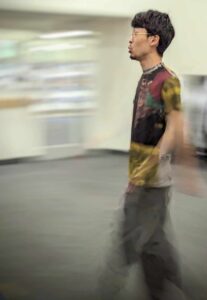THOUGHTS, IDEAS, QUESTIONS, PROCESS, LESSONS,
Student Post
Middle form and Missing home
OSHOW – Week 5
Week 5
Week 5.
I liked the YWT method from last time, so I’ll use it again this week to reflect on it. It’s often said that it’s better not to get stuck in a pattern, but we need a format to feel comfortable.
ーーーー Y: What I did.
-I did some long forms.
-I did a middle form called “More or Less”.
-I talked with Rina from Tightrope Theatre via Zoom.
-Cirque du Soleil clown Duncan came to our rehearsal.
 -I’m a little homesick.
-I’m a little homesick.
ーー W:What I found out
-It is the same in both short form and long form. It’s “do what you need to do right now”.
Shawn says, “In long form, you tend to move forward a tiny bit”. This is due to player fear. They put off what is important and delay the story.
That doesn’t happen in Akira Kurosawa’s films. They always keep moving forward.
-But on the other hand, some say it’s very masculine storytelling. In the “Bechdel Test” format developed by Lisa Rowland of BATS, the story rather doesn’t move forward. It’s not, “What happens next?” rather than “What else?”. It shows the multifaceted nature of the characters.
Neither is right.
There is no doubt that both have the potential to be great works. What is important is whether the concept of “what you want to show” is there when you play the show.
-Middle form is a very educational format.
Middle form is one that allows audience to choose whether or not you want to make a continuation from one scene. We don’t make in short, we make in longs. It is a format that bridges the gap between short and long.
In “More or Less,” after a scene is over, the audience votes on whether or not they want to see the rest of that scene. If they want to see more, they vote “More”; if not, they vote “Less”.
Through experience, we can learn what attracts and loses the audience’s interest.
I thought many long form and full length players should do this.
-I feel that there are not enough workshops on direction in the world.
Cindy from the Netherlands said after doing “More or Less” that she didn’t have much experience directing shows in her country because there are not many shows with directors.
It is certainly true that globally, I have never seen a workshop that only focuses on directing. However, in Japan, there are workshops that focus on directing, and even beginners experience directing from a very early level. I think this is influenced by the fact that my friend Takao Utsumi, who runs the Improv Academy with me, started offering direction workshops early on.
He said, “I used to think that being a director is something you do step by step after you have some experience, but I thought I could learn more by learning at the same time”. I fully agreed with him and tried to make sure that every member of my own team experienced being a director during rehearsals and performances.
In fact, I think the effect of that came out in the performance. People who have directing experience are indispensable in impro shows because they can see the whole scene and the whole show from a bird’s eye view while performing.
-They are easy to go on stage here.
Tightrope Theatre has Maestro on Thursdays, Gorilla Theater on Fridays, and Superscene and Late Show on Saturdays. And as for Thursday and Friday, the players are quite flexible. If a guest from overseas comes, they invite him or her, and the cast can be changed on the day of the show.
I think this system, whether it is Loose Moose or Tightrope, should be introduced to Japan. Because in the Japanese impro world today, there are places for students to learn, but there are not enough places for them to perform. Unless you join a team or organize your own show, you will never get a chance to perform in a show.
I believe that you have to be in a show to be an improviser. While rehearsals and workshops are safe and secure, shows are not. The audience will be watching you, and you will be more nervous than usual. However, it is only when you are in such a situation that you can see if you can really make use of what you have learned in impro. And that is how you really grow.
-You can tell who is an experienced player just by the way they stand.
When I first met Duncan,(Cirque du Soleil Clown), I knew from his physicality that he was not just anyone, and my instincts were right.
His body was prepared, ready to react anywhere and at any time, and I sensed a wealth of training and experience. As I mentioned last week, you can already tell if a player is good or not by the way he or she stands. A poor player is somewhat lazy and leaks energy. A good player seems to have it all under control.
Whether you are an improviser, a clown, an actor, or a dancer, experience is important.
-After a month, I get used to it, for better or worse. The first two or three weeks were exciting, but as I got used to it, I started to miss Japan and my wife. I want to go home…
ーー T: What I will do next
-To hold a workshop of direction overseas. If there are not so many of them at present, it would be good if I, who can do it, do it. I have some exercise cards.
-Create a place where people who are learning can easily stand in for a show. Not an open mic, but a well-prepared show. Organize it with my team as the main organizer, and invite students and players from other teams in the form of guests. In this way, I would like to circulate learning and performance, and at the same time deepen exchanges among improvisers.
We are creating a place where people who share the common language of impro can cooperate and operate together, rather than forming factions and working only within those factions.
-We will always find something new in our daily life and rehearsals. I must go out to get stimulation from myself!
Week 5.
I liked the YWT method from last time, so I’ll use it again this week to reflect on it. It’s often said that it’s better not to get stuck in a pattern, but we need a format to feel comfortable.
ーーーー Y: What I did.
-I did some long forms.
-I did a middle form called “More or Less”.
-I talked with Rina from Tightrope Theatre via Zoom.
-Cirque du Soleil clown Duncan came to our rehearsal.
-I’m a little homesick.
ーー W:What I found out
-It is the same in both short form and long form. It’s “do what you need to do right now”.
Shawn says, “In long form, you tend to move forward a tiny bit”. This is due to player fear. They put off what is important and delay the story.
That doesn’t happen in Akira Kurosawa’s films. They always keep moving forward.
-But on the other hand, some say it’s very masculine storytelling. In the “Bechdel Test” format developed by Lisa Rowland of BATS, the story rather doesn’t move forward. It’s not, “What happens next?” rather than “What else?”. It shows the multifaceted nature of the characters.
Neither is right.
There is no doubt that both have the potential to be great works. What is important is whether the concept of “what you want to show” is there when you play the show.
-Middle form is a very educational format.
Middle form is one that allows audience to choose whether or not you want to make a continuation from one scene. We don’t make in short, we make in longs. It is a format that bridges the gap between short and long.
In “More or Less,” after a scene is over, the audience votes on whether or not they want to see the rest of that scene. If they want to see more, they vote “More”; if not, they vote “Less”.
Through experience, we can learn what attracts and loses the audience’s interest.
I thought many long form and full length players should do this.
-I feel that there are not enough workshops on direction in the world.
Cindy from the Netherlands said after doing “More or Less” that she didn’t have much experience directing shows in her country because there are not many shows with directors.
It is certainly true that globally, I have never seen a workshop that only focuses on directing. However, in Japan, there are workshops that focus on directing, and even beginners experience directing from a very early level. I think this is influenced by the fact that my friend Takao Utsumi, who runs the Improv Academy with me, started offering direction workshops early on.
He said, “I used to think that being a director is something you do step by step after you have some experience, but I thought I could learn more by learning at the same time”. I fully agreed with him and tried to make sure that every member of my own team experienced being a director during rehearsals and performances.
In fact, I think the effect of that came out in the performance. People who have directing experience are indispensable in impro shows because they can see the whole scene and the whole show from a bird’s eye view while performing.
-They are easy to go on stage here.
Tightrope Theatre has Maestro on Thursdays, Gorilla Theater on Fridays, and Superscene and Late Show on Saturdays. And as for Thursday and Friday, the players are quite flexible. If a guest from overseas comes, they invite him or her, and the cast can be changed on the day of the show.
I think this system, whether it is Loose Moose or Tightrope, should be introduced to Japan. Because in the Japanese impro world today, there are places for students to learn, but there are not enough places for them to perform. Unless you join a team or organize your own show, you will never get a chance to perform in a show.
I believe that you have to be in a show to be an improviser. While rehearsals and workshops are safe and secure, shows are not. The audience will be watching you, and you will be more nervous than usual. However, it is only when you are in such a situation that you can see if you can really make use of what you have learned in impro. And that is how you really grow.
-You can tell who is an experienced player just by the way they stand.
When I first met Duncan,(Cirque du Soleil Clown), I knew from his physicality that he was not just anyone, and my instincts were right.
His body was prepared, ready to react anywhere and at any time, and I sensed a wealth of training and experience. As I mentioned last week, you can already tell if a player is good or not by the way he or she stands. A poor player is somewhat lazy and leaks energy. A good player seems to have it all under control.
Whether you are an improviser, a clown, an actor, or a dancer, experience is important.
-After a month, I get used to it, for better or worse. The first two or three weeks were exciting, but as I got used to it, I started to miss Japan and my wife. I want to go home…
ーー T: What I will do next
-To hold a workshop of direction overseas. If there are not so many of them at present, it would be good if I, who can do it, do it. I have some exercise cards.
-Create a place where people who are learning can easily stand in for a show. Not an open mic, but a well-prepared show. Organize it with my team as the main organizer, and invite students and players from other teams in the form of guests. In this way, I would like to circulate learning and performance, and at the same time deepen exchanges among improvisers.
We are creating a place where people who share the common language of impro can cooperate and operate together, rather than forming factions and working only within those factions.
-We will always find something new in our daily life and rehearsals. I must go out to get stimulation from myself!
Translated with
www.DeepL.com/Translator
(free version)




0 Comments